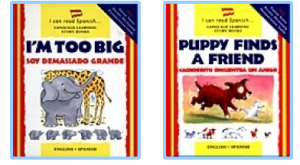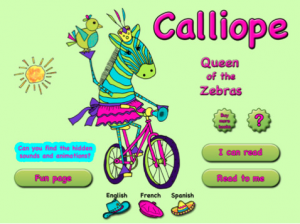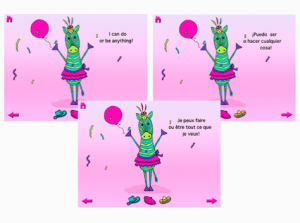This story has beautiful illustrations to help talk about the weather in Spanish.
¡Vámonos!
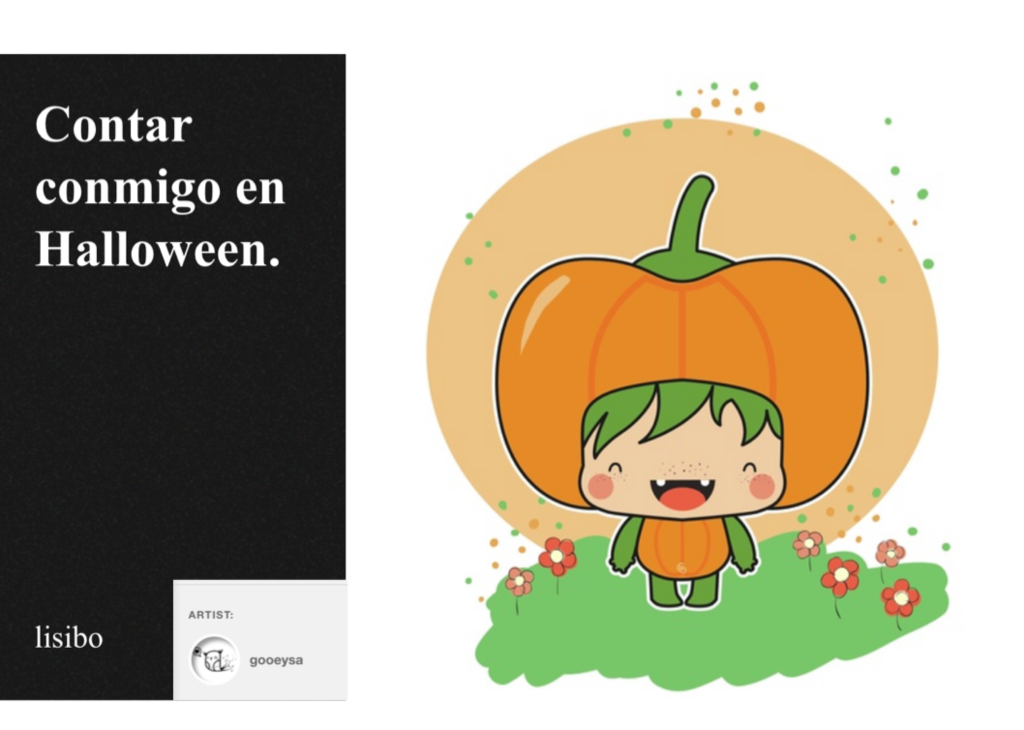
A new Storybird that has not been seen previously, especially for Halloween – and specifically written for RGo at WCPS ;o)
Count with Calabaza (Pumpkin) from 0 to 9, and then find the Halloween objects in the story.
Hope you enjoy it!
UPDATED October 2020
Storybird have changed the ability to share so here it is narrated as a PPT.
Another Storybird, this time with more text.
“Mis amigos raros is a Spanish story about Eduardo’s friends who are all a little out of the ordinary.”
Mis amigos muy raros. on Storybird
I’ve decided to (re)publish my Storybirds over the next few days. Here’s the first, a very very simple ‘story’ about colours in Spanish.
Los colores on Storybird
La Consejería de Educacción en el Reino Unido e Irlanda has just sent me the following invitation that I’d like to share as I know it will be a wonderful day!
Spanish Seminar
En español, ¿por qué no?, Delivering the curriculum through Spanish
30th November 2012Arena and Convention Centre (Hall 12), Kings Dock, Liverpool Waterfront
The Seminar will review and debate the integrated learning of Spanish through curriculum content.
The seminar is free of charge, funded by the Consejería.
Please fill in and send us the enclosed application form before November 22nd.……………………..
Seminario del español
En español, ¿por qué no?, Delivering the curriculum through Spanish
30 de noviembre 2012Arena and Convention Centre (Hall 12), Kings Dock, Liverpool Waterfront
El Seminario tratará sobre el aprendizaje de español a través de contenidos, con ejemplos recientes en el Reino Unido.
Es gratuito, subvencionado por la Consejería.
Para inscribirse, rellene y envíe a este correo el formulario adjunto, antes del 22 de noviembre.
The ‘enclosed form’ is here – Formulario. The programme for the conference is below.
It looks a great day with a mixture of research and theory about, and classroom experiences of CLIL and bilingual learning. And it’s free, plus not in London!
I was reflecting today how much things have changed since I began teaching – we still used a banda machine (ah, the smell of that fluid!), Spain had the peseta, computers were huge and static, and the www was in its infancy. Even in the last few years things have changed significantly with the arrival of smartphones and tablets – “fruity” or otherwise ;o)
By coincidence, I’d found that a resource I’ve used as a primary school teacher has now been released in a new format.
When first taught primary languages I discovered the I CAN READ series of books, firstly in French and then in Spanish. These bilingual books allowed learners to read the simple stories in English and French or Spanish at the same time, meaning that they were never unsure about the meaning of vocabulary. It also made it less ‘risky’ for a learner to choose such a book as they didn’t have the mental block of all the words being ‘foreign’.
Then, as learning became more ‘technological’ and with the advent of the IWB, Early Start began to market the books as Big Books on CD Rom, offering French Spanish and some German books. This meant that a whole class could read the book together, or have it read to them. They could complete activities collaboratively and discuss the text, focussing on individual items of vocabulary or grammar points like adjectives or exclamations. and of course, individuals could access them and play independently with the sound of the language adding to the reading that was possible with the books.
And now bsmallpublishing have added ebooks to the mixture! Priced £4.99 and available from the iTunes app store, there are currently 10 French and 2 I can read… Spanish titles, and then 3 Let’s read (aimed at older KS2/KS3 readers) eBooks in Spanish and French.
The eBooks all feature a helpful ‘tips and shortcuts’ page which explains how to interact with the book – the eBooks are intuitive but there are certain things, such as how to stop the book from reading in English and skip to the French/Spanish, that are best made explicit from the start.
Below are screenshots from two of the books – Soy demasiado grande and Le facteur spatial showing some of the features such as Read to me (press the green triangle), the thumbnail bar that appears so you can skip to the correct page, and the vocabulary/pronunciation page that highlights the key words in the book.

The bsmall webpage explains –
We have been busy preparing ebook versions of some of our bilingual stories. Our bilingual books are designed as fixed layout, colour ebooks with read aloud capabilities in two languages. They are in the epub format. They are readable on your iPad via the iBooks App and will be available soon for Kobo Vox and Kindle Fire. We’re adding more and more devices/distribution options as we go along so watch this space.
Read a little more about our list’s journey from print to digital on our blog.
And here is a Youtube video demonstrating how the books work using George, le poisson rouge.
httpv://youtu.be/1XA99B0ento
I think that the eBooks are great for individual pupil access which is after all the idea of a mobile device. The stories are simple yet appealing, and feature repetition of words and structures, making them very accessible to beginners as well as intermediate learners. If I were to use it as a teaching tool, I would want a way to choose between hearing the English OR the French/Spanish OR both, rather than having to ‘jump in’ as quickly as possible to isolate the French/Spanish story – perhaps a future update might allow this. The vocabulary section is great too – a clear picture dictionary makes it very accessible to personal learning. I might like to see some phrases added to this e.g. me gusta – I like / no me gusta – I don’t like or tengo – I have and quiero – I want in Soy demasiado grande; however, I appreciate that the idea of a picture dictionary is that it is visual and sentences are more difficult to illustrate clearly!
The other great thing about the eBooks is that, once purchased, they go into your iBooks library where you can use all the feature of that app too such as the ability to ask it to speak a word or phrase that you highlight (in any language for which you have the keyboard), define to find out the meaning of words or the search facility to find every occurrence of a certain word.
There’s a part of me that still loves ‘proper’ books, and I’m not entirely convinced that I’ll ever completely abandon the joy of literally turning pages, but I have to admit that in the language classroom, eBooks are a great tool that allow independent access to stories (and information books of course!) in other languages, not just in written but also in spoken form.
Just found this lovely story app via my Google Reader. Called Calliope, Queen of the Zebras, it’s a very simple story that you can read or have read to you. And it is written in English, Spanish and French – you change language by clicking on the cowboy hat, beret and sombrero so you can read each page in a different language if you want. The book also has hidden animations and sounds, and a fun page on which you can dress Calliope. And it’s a lovely story too –
“I can sing or swing,
I can be or do anything.”
There are another two story apps from StoryBook Express – Dott Meets Watt and If I only had wings, both of which are in English Spanish and Vietnamese, and come with a parent’s guide of questions to get your child talking.
I’ll be looking out for more in the series too…
Thanks to @AliceAyel on Twitter for flagging up a great post on a blog called Teaching Spanish w/ Comprehensible Input by Cynthia Hitz. The post is entitled Using videos of children’s stories and lo and behold, there was my son’s favourite story as a child, playing to me in Spanish.
Entitled Click Clack Muu, Vacas escritoras (Click Clack moo, Cows that type) the story is set on a farm where the cows get hold of a typewriter and start sending letters to Farmer Brown demanding electric blankets. And then the ducks get involved… Isaac is now 14 and can still recite it verbatim. And so can I! So it’s great to see this post with so many ideas of how you might use it in the classroom. If only I had a class with whom to share it.
httpv://youtu.be/MQS-_5_MP-Q
I found these Resources from PBS – they’re in English but there are some great ideas that could be translated into Spanish.
Gracias @sonrisadelcampo and thanks Isaac for the memories ;o)
I wholeheartedly believe that learning a language shouldn’t be a ‘bolt on’ but part of the curriculum as a whole, and I am therefore always on the look out for new ideas.
I found this short video clip on Youtube earlier and it started me thinking. Again! httpv://youtu.be/58IoBEoNyWQ
Whilst I’m not sure that this is something that could be done at the moment given the weather reports I’m seeing, it’s certainly an interesting idea and it could be completed using the second clip. Just use a stopwatch and count for 10 or 60 seconds then complete the sum to find out how hot it was when that film was recorded.
httpv://youtu.be/CQFEY9RIRJA
I’ve blogged before about teaching Maths in Spanish and I also taught Maths in Spanish during my last observation at WCPS. I can’t believe I didn’t blog it but I’ve uploaded the plan and resources below.
table names (2D shapes in Spanish)
Lesson plan – Razones y proporciones
Worksheet for círculos y triángulos
Worksheet – pentágonos y cuadrados
Since then I’ve found a few more things that look quite useful.
 ¿Quién quiere pizza? is a series of lessons by Cynthis Lanius on fractions. It’s also available in English. Each ‘lesson’ gives a short explanation then poses four or five multiple choice questions. Answer the questions and then receive your score at the bottom of the page including the correct answers.
¿Quién quiere pizza? is a series of lessons by Cynthis Lanius on fractions. It’s also available in English. Each ‘lesson’ gives a short explanation then poses four or five multiple choice questions. Answer the questions and then receive your score at the bottom of the page including the correct answers.
Cynthia also offers some counting activities in Spanish that you could easily use with much younger learners, counting things, saying which is more, and completing sequences. And finally, a more advanced type of Maths linked to Science – in La tina caliente learners work on interpreting graphs
 Then there’s Maggie’s Earth Adventures. These activities from Scholastic are also offered in both English and Spanish.
Then there’s Maggie’s Earth Adventures. These activities from Scholastic are also offered in both English and Spanish.
In El Dilema de Dude you must rescue Dude the dog from the roof by solving sums in Spanish. Every sum solved takes your helicopter closer to Dude. You can choose which operation you wish to practice – or you can choose a mix – and also the level at which you play.
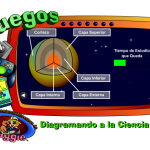
In a similar vein, in ¡Alrededor del Mundo en 80 segundos! you travel around the world by solving sums. You must do it quickly or you’ll not make it home!
And then there’s a brilliant Science activity that involves labelling. In Diagramando a la ciencia learners see a diagram and then have to label it for themselves. Included are things like parts of a plant, the layers of the earth and parts of a fish. Good resources to use to reinforce learning.
There are others activities here too worth investigating – code breaking, a Spanish vocabulary game and a grammar game too.
Maths glossary (far more information than you’d need in a primary classroom!)
much more simple maths terms
Logic puzzles for Year 7 from the inimitable Rachel Hawkes
On the Juegos Educ.ar site, Cuenta con cuentos and Cuentos y leyendas are both word puzzles. Figuras geométricas is a simple matching activity.
And how about the Matemáticas section here for some simple fun activities, or the site of Colegio Público San José de Calasanz for some Maths appropriate for KS2.
And finally, lots of activities here on RinconMaestro plus some good word puzzles – Problemas – on Aprendiendomates.
How’s that to keep you going? Need to find more science links now…
¡Vámonos! ©2026. All Rights Reserved.
Powered by WordPress.
Theme by Phoenix Web Solutions

